八年级下英语第一单元教案
- 格式:doc
- 大小:116.50 KB
- 文档页数:5

Unit1 SectionA(3a-3c)名师教案1.0Teaching analysis教情分析1.1Teaching objectives 教学目标1.1.1Language goals 语言目标1.1.1.1 Key Words and Chunks1.1.1.1.1 For applying: passenger, get off, to one’s surprise, onto, trouble, hit, right away, get into1.1.1.1.2 For comprehending: expect, without thinking twice1.1.1.2 Sentence Structures1)When the driver saw an old man lying on the side of the road.2)The bus driver, 24-year-old Wang Ping, stopped the bus without thinking twice.3)He expected most or all of the passengers to get off and wait for the next bus.4)But to his surprise, they all agreed to go with him.5)Thanks to Mr. Wang and the passengers, the man was saved by the doctors in time.6)It’s said that many people don’t want to help others because they don’t want any trouble.1.1.1.3 Grammar Focus1) At 9:00 a.m. yesterday, bus No.26 was going along Zhonghua Road…(was going是由be动词的过去式加上动词-ing形式构成的“过去进行时”。
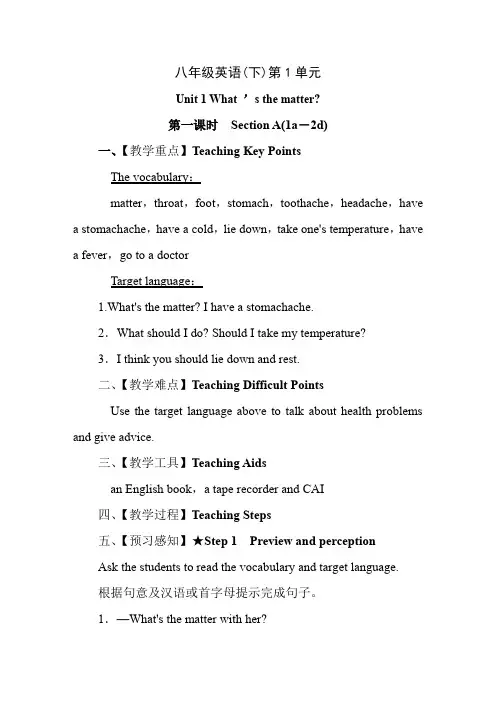
八年级英语(下)第1单元Unit 1 What ’s the matter?第一课时Section A(1a-2d)一、【教学重点】Teaching Key PointsThe vocabulary:matter,throat,foot,stomach,toothache,headache,have a stomachache,have a cold,lie down,take one's temperature,have a fever,go to a doctorTarget language:1.What's the matter? I have a stomachache.2.What should I do? Should I take my temperature?3.I think you should lie down and rest.二、【教学难点】Teaching Difficult PointsUse the target language above to talk about health problems and give advice.三、【教学工具】Teaching Aidsan English book,a tape recorder and CAI四、【教学过程】Teaching Steps五、【预习感知】★Step 1Preview and perceptionAsk the students to read the vocabulary and target language.根据句意及汉语或首字母提示完成句子。
1.—What's the matter with her?—She has a very sore t______ now.2.He ate too much,so he had a s______.3.If you feel tired,you should l______ down and rest.4.If you ______(咳嗽),drink some hot tea with honey.5.He wants to see a dentist,because he has a ______(牙疼).★Step 2Consociation and exploration【合作探究】Let the students read the book by themselves in order to find out the answers.They can discuss the questions in groups or ask the teacher for help.When they finish the questions,ask some students to check the answers.★Step 3Leading in【情景导入】Ask a student to act something is wrong with his/ her head…And T:What's the matter?Help the students to answer:I have a…Have the students repeat.★Step 4Pre-task【准备任务】Page 1,1a &1b1.Look at the picture.Write the correct letter [a-m] for each part of the body.2.Match each activity.3.Play the tape and ask the students to listen and find the answers.Page 1,1c1.Focus on the conversation in the box.2.Practice reading.3.Pairwork:Ask the students to look at the picture and practice in pairs like this:S1:What's the matter?S2:I have…4.Groupwork: Divide the class into some groups.Make conversations.S1:What's the matter?S2:She talked too much yesterday and didn't drink enough water.She has a very sore throat now.S3:…★Step 5While-task【过程任务】Page 2,2a&2b1.Play the recording for the first time.Students listen and number the pictures [1-5] in order.2.Check the answers.3.Play the recording a second time and say:There are five conversations.Some have some problems and the others give them some advice.Listen and match the problems with the advice.★Step 6Post-task【后续任务】Page 2,2c & 2d1.Focus on the conversation in 2c & 2d.2.Practice reading.Make the students scan the conversations first.3.Teach and then make the students role-play the conversation in pairs.4.Play the recording and ask the students to listen and repeat 2d.★Step 7Consolidation practice【巩固练习】Look at the students' book of the 1st exercise.★Step 8Summary【课堂小结】In this class we should master “matter,stomach,toothache,headache,have a stomachache,have a cold,take one's temperature”and some sentences in target language.★Step 9Homework【家庭作业】1.Listen to the tapes twice.2.Practice the conversation on Page 2,2d.Board Design板书设计Unit 1What's the matter?The first period Section A(1a-2d)1.Key vocabulary:have a stomachache;have a cold; lie down;take one's temperature;have a fever;go to a doctor2.Target language:(1)What's the matter? I have a stomachache.(2)What should I do? Should I take my temperature?(3)I think you should lie down and rest.。

人教版英语八年级下册unit1 1a-1c 主备人:年级:__八学生课堂学习情况反馈教学反思学标教目矢口识目标Learn to describe and talk about the health problems and accidents.Learn to give others some right advice according to their problems.能力目标:students can talk about health problems and give advice with the language points.情感目标:learn to care more about their health.教师活动环节First have a dictation of the new words learned yesterday.Tell them they'll continue to learn how to talk about health problems and give advice .小标导J 审Ask the students to guess what 's the matter with the students in 2a .Then try to find the advice to differentproblems .Get them to translate the phrases . G 主探Play the recording and get them to finish 2a and 2b .Ask them to make conversations according to the listening material .1A作助 1审鬻What' s the matter? I have a…”and give advice by using“should” .教学难点Learn to talk about healthproblems and to give advice .课型听说课时 2学生活动个性修改Have a dictation of the new wordslearned yesterday.Go over the points learned yesterday .Guess what 's the matter with the studentsin 2a and write down .Find the advice to different problems .Translate the phrases .Finish 2a and 2b .Make conversations according to thelistening material .学生课堂学习情况反馈教学反思学科英语课题《unitl 2d , 4b》主备人:年级:__八学标教目知识目标:Learn to give others some right advice according to their problems.能力目标:Enable students to talk about health problems and give advice with the language points.情感目标:Students care more about themselves and their family members ' health.教师活动环节Tell them that they'll continue to learn how totalk about health problems and give advice.Today they'll learn a conversation and talkabout health problems.标1导刘Ask the students to read the dialogue bythemselves , underline the new words and thewords they don't know.Get them to answer the questions given by the teachers. G 主探Get them to work together and find out theanswers according to the conversation. Then role play the conversations. A作助旧教学重点Learn to talk about healthproblems by using “What' s thematter? I have a …” and giveadvice by using “should”.教学难点Learn to give appropriate adviceto the certain health problems.课型听说课时 3学生活动个性修改Continue to learn how to talk abouthealth problems and give advice.Learn a conversation and talk about health problems.Read the dialogue by themselves ,underline the new words and the wordsthey don't know.Answer the questions given by theteachers.work together and find out the answersaccording to the conversation.Then role play the conversations.学生课堂学习情况反馈教学反思学科英语课题《unit 1 grammar-4b》主备人:年级:_八学科英语课题《unitl section B 1a- 1c》主备人:年级:_八教学资源(含自编习题、阅读文章、听力资料、知识链接等)学科英语课题《unitl section B 2b-2e》主备人:_年级:_八学科英语课题《unitl self check》主备人:_年级:_八__。
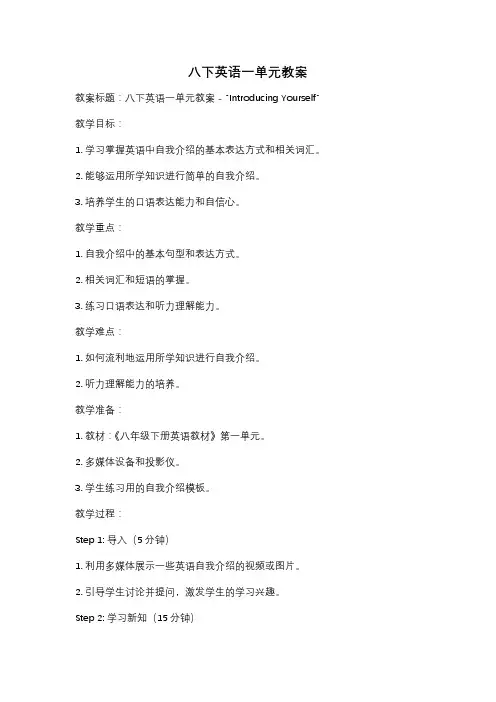
八下英语一单元教案教案标题:八下英语一单元教案 - "Introducing Yourself" 教学目标:1. 学习掌握英语中自我介绍的基本表达方式和相关词汇。
2. 能够运用所学知识进行简单的自我介绍。
3. 培养学生的口语表达能力和自信心。
教学重点:1. 自我介绍中的基本句型和表达方式。
2. 相关词汇和短语的掌握。
3. 练习口语表达和听力理解能力。
教学难点:1. 如何流利地运用所学知识进行自我介绍。
2. 听力理解能力的培养。
教学准备:1. 教材:《八年级下册英语教材》第一单元。
2. 多媒体设备和投影仪。
3. 学生练习用的自我介绍模板。
教学过程:Step 1: 导入(5分钟)1. 利用多媒体展示一些英语自我介绍的视频或图片。
2. 引导学生讨论并提问,激发学生的学习兴趣。
Step 2: 学习新知(15分钟)1. 通过多媒体展示自我介绍的基本句型和表达方式。
2. 解释并讲解相关词汇和短语的意思和用法。
3. 分角色进行对话练习,模拟自我介绍的场景。
Step 3: 练习与巩固(20分钟)1. 学生分组进行自我介绍的练习,互相评价并提出改进建议。
2. 老师进行示范,给予学生指导和反馈。
3. 利用多媒体播放自我介绍的听力材料,让学生进行听力理解练习。
Step 4: 拓展与应用(10分钟)1. 学生分组进行小组讨论,结合所学内容,设计一个自己独特的自我介绍。
2. 鼓励学生展示自己的创造力和表达能力。
Step 5: 总结与反馈(5分钟)1. 老师进行总结,强调学生在自我介绍中需要注意的要点。
2. 学生进行自我评价,反思自己在学习过程中的不足和进步。
教学延伸:1. 布置作业:要求学生用英语写一篇关于自己的短文,并准备下节课进行口头展示。
2. 鼓励学生多参与英语角或其他英语实践活动,提高口语表达和听力理解能力。
教学评估:1. 教师观察学生在课堂练习中的表现,包括口语表达和听力理解。
2. 学生之间进行互评和自评,评价自己在练习中的表现和进步。
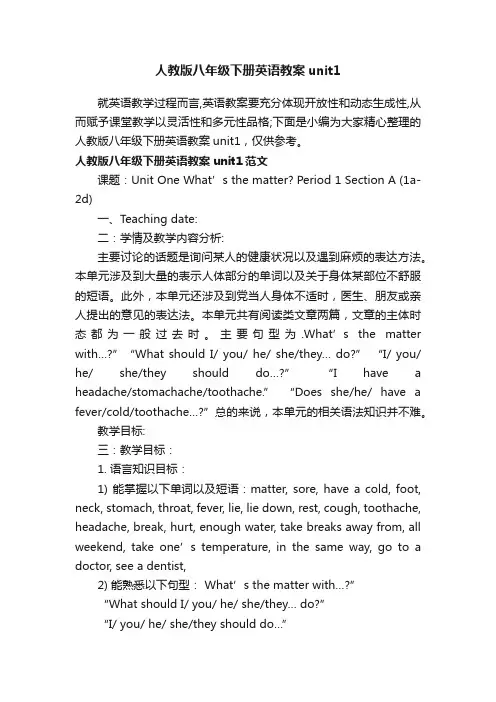
人教版八年级下册英语教案unit1就英语教学过程而言,英语教案要充分体现开放性和动态生成性,从而赋予课堂教学以灵活性和多元性品格;下面是小编为大家精心整理的人教版八年级下册英语教案unit1,仅供参考。
人教版八年级下册英语教案unit1范文课题:Unit One What’s the matter? Period 1 Section A (1a-2d)一、Teaching date:二:学情及教学内容分析:主要讨论的话题是询问某人的健康状况以及遇到麻烦的表达方法。
本单元涉及到大量的表示人体部分的单词以及关于身体某部位不舒服的短语。
此外,本单元还涉及到党当人身体不适时,医生、朋友或亲人提出的意见的表达法。
本单元共有阅读类文章两篇,文章的主体时态都为一般过去时。
主要句型为.What’s the matter with…?”“What should I/ you/ he/ she/they… do?” “I/ you/ he/ she/they should do…?” “I have a headache/stomachache/toothache.” “Does she/he/ have a fever/cold/toothache…?”总的来说,本单元的相关语法知识并不难。
教学目标:三:教学目标:1. 语言知识目标:1) 能掌握以下单词以及短语:matter, sore, have a cold, foot, neck, stomach, throat, fever, lie, lie down, rest, cough, toothache, headache, break, hurt, enough water, take breaks away from, all weekend, take one’s temperature, in the same way, go to a doctor, see a dentist,2) 能熟悉以下句型:What’s the matter with…?”“What should I/ you/ he/ she/they… do?”“I/ you/ he/ she/they should do…”2. 情感态度价值观目标:教会学生关心他人,培养同学间团结、友善的精神。
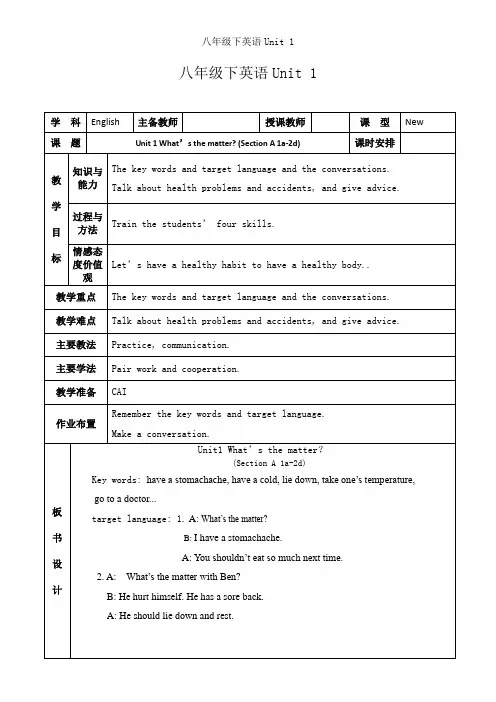

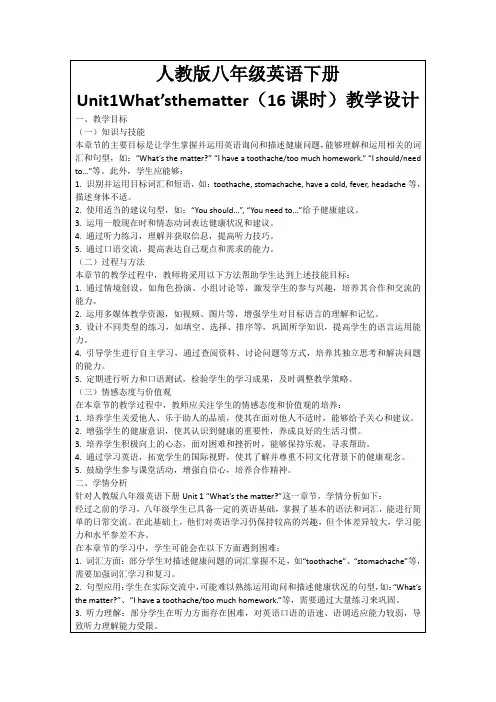
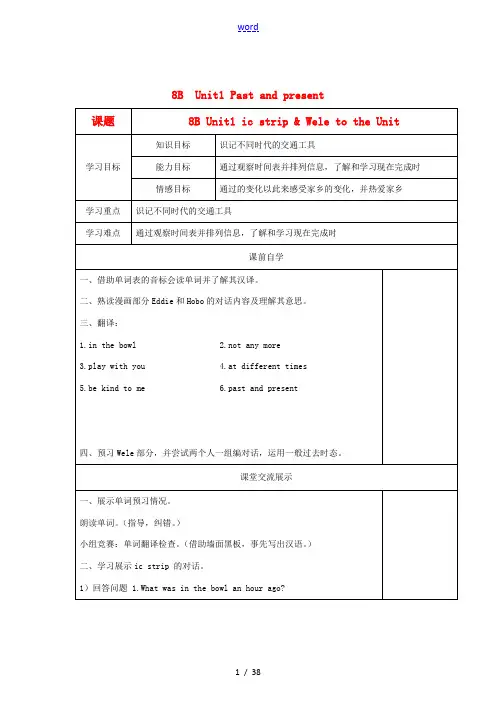
8B Unit1 Past and present8B Units1导学案参考答案Unit1第一课时:一、1.was 2.has eaten 3.to have 4.to play 5.is eating 6.took 7.rode8.will be二、1.would like , grows up 2.walks to school 3.goes to work by bus 4.flies to5.don’t want to any more第二课时:一、1.know about 2.get married 3.move out 4.water pollution 5.in the centreof6.feel lonely7.turn into8.from time to timeed to do 10.in some ways二、well has lived southern got married in the centre of children has changed a lotmarket stallsHas turned into to play cards pleasant shoe factory waste waterfish and plants polluted took action cleaner in some ways open space lonely第三课时:一、1. I don’t want to play with you any more.2.There used to be the home of birds.3.He live in Beijing since he moved here.4.In the past ,many people had no money to go to school.5.Nanjing has changed a lot in the past five years.6.Many friends have moved to other places ,so I feel lonely from time to time.7.I had an interview with my Chinese teacher this morning.8.It has bee more difficult to play chess with my old friends.二、1.Where have they gone ..2.How long has lived3.When was born4.you helping me第四课时:一、1.dishonest 2.unhappy 3.unlucky 4.impolite 5.unkind二、D C C B C A三、1.cheaper 2.healthiest 3.impossible 4.safely 5.well better第五课时:一、1.They haven’t read the book yet.Have they read the book yet? Yes, they have/ No , they haven’t1.How long has Daniel stayed in Shanghai?2. I have known him for ten years.3.Sandy has been in Beijing for half an hour.二、1. Have seen have did see2.lent hasn’t given 3.have been did visit第六课时:一、C C A A D B二、1. He has already finished homework.2.Have you ever been to Beijing?3.I have known Linda for 3years.4. I have just seen Lily.5.We haven’t heard from him for a long time.第七课时:一、1.is 2.do 3.will be 4.shall go 5.taught 6.has taught 7.has gone8.Have seen 9.have learned 10.will arrive二、1.How long have you known him?2.Has Jane finished her homework?3.I haven’t worked in this school for two years.4.Why hasn’t Jim finishedhis homework?5.when did you buy this watch?6.Who is the old man next to Lily?7.Which girl is my sister?8.How far is your home from your school?第八课时:一、1.advantages 2.reduce 3.changed 4.developments 5.service6.interview7.realizes 9.repair二、1.recently 2.unpleasant 3.impolite 4.have done 5.left6.southern7.polluted8.Has arrived arrived9.has eaten 10.have been第九课时:第十课时:一、1.as often as before 2. have an interview with sb ed to do sth 4.so big and modern5.in the north of二、1. was has lived 2.was made 3.Has arrived arrived 4.has eaten5.safely6.has been7.have been三、1.B 2.C 3.B 4.C 5.D 6.A四、1.Have you anything 2.doesn’t provide any longer 3.since ago ed to5.has been to。
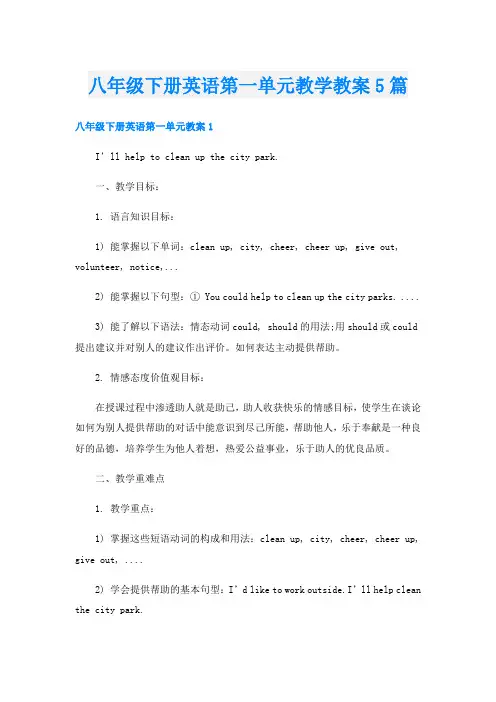
八年级下册英语第一单元教学教案5篇八年级下册英语第一单元教案1I’ll help to clean up the city park.一、教学目标:1. 语言知识目标:1) 能掌握以下单词:clean up, city, cheer, cheer up, give out, volunteer, notice,...2) 能掌握以下句型:① You could help to clean up the city parks. ....3) 能了解以下语法:情态动词could, should的用法;用should或could 提出建议并对别人的建议作出评价。
如何表达主动提供帮助。
2. 情感态度价值观目标:在授课过程中渗透助人就是助己,助人收获快乐的情感目标,使学生在谈论如何为别人提供帮助的对话中能意识到尽己所能,帮助他人,乐于奉献是一种良好的品德,培养学生为他人着想,热爱公益事业,乐于助人的优良品质。
二、教学重难点1. 教学重点:1) 掌握这些短语动词的构成和用法:clean up, city, cheer, cheer up, give out, ....2) 学会提供帮助的基本句型:I’d like to work outside.I’ll help clean the city park.2. 教学难点:学会提供帮助的基本句型三、教学过程Period 1(Section A 1a-2d)Step 1 Warming up1. 播放学生志愿者进行义务帮助别人的活动视频,通过询问他们以下问题来引导学生们了解社会上一些的志愿们进行的活动。
Step 2 New words Read new words on p9-10.Step 3 Discussion1. 1a. Look at the ways you could help others. Then list other ways.2. Ss discuss with their partners and write the ways one could help others:① Help plant trees by the river. ② Help clean up the city park.③ Visit the old people in the old people’s home. ④ Help young kids to learn English.Step 4 Listening1. T: Tell Ss to read the sentences in the chart. Make sure they know the meaning of the sentences.2. 1b. Play the recording for the Ss to listen and number the ways the boy and girl could help others.Step 5 Pair work1. Let Ss read the conversation in the picture.2. 1c. Use the information in the chart of 1b to make other conversations.A: I hope to work outside.B: You could help to clean up the city parks. ........3. Let some pairs act out their conversations.Step 6 Listening1. 2a:T: A group of students are planning a City Park Clean-up Day. Listen and check (√) the things they are going to do to tell people about it.1. Look at the pictures in 2a. Discuss the things they are going to do.2. Play the recording for the Ss to listen and check the pictures.3. Play the recording again to check the answers.2. 2b:1. Let Ss read the sentences below. Explain some main sentences for the Ss. Make sure they know what to do.2. Play the recording for the Ss to write the correct words in the blanks.3. Play the recording again to check the answers.Step 7 Pair work1. 2c. Tell Ss to make a conversation using the information in 2a and 2b.2. Let one pair to read out thei r conversation first.e.g. A: We need to come up with a plan for the City Park Clean-Up Day.B: Let’s have lunch first.A: No, we need to start now. Clean-Up Day is only two weeks from now.B: You’re right. We can’t put off making a plan. As we talk, I’ll write down all our ideas. Then we can decide which ideas are best.A: Let’s make some notices, too. Then I’ll hand them out after school.B: And we could each call up ten students and ask them to come.3. Ss act the conversation in pairs. Ask some pairs to act out their con versations.Step 8 Reading and Role-play1. Read the conversations and answer the two questions:① Where’s Helen going to work this summer?__________________________________② What did Tom do to help the old people?____________________________________Answers: She’s going to work in an old people’s home.Reading the newspaper or just talking to the old people.2. Read the conversation after the teacher.3. Practice the conversation with their partner. Then let some pairs to act out the conversation.Homework:Teaching thought:Period 2(Section A 3a-3c)Step 1 Revision1. Write down the phrases.1. 打扫 ________2. 分发 ________3. 曾经 _______4. (使)变得高兴 ________5. 义务做某事 _________________6. 大打扫日 ______________7. 想出主意(办法)____________2. Role-playA: Hi, Tom. I’m making some plans to work in an old people’s home this summer.B: Really? I did that last summer!Step 2 New words Read new words on p11.Step 3 Reading1.Tell Ss to read the article in 3a quickly and try to find the answers to these questions:1. What does Mario love?2. What does Mary love?3. What do Mario and Mary volunteer to do?Ss read the article quickly and try to answer the questions:Answers: 1. He loves animals.2. She loves reading books.3. Mario volunteers at animal hospital and Mary helps kids learn to read.2.3b: Read the article again and answer the questions.1. Why does Mario volunteer to help others?2. Why does Mary volunteer to help others?3. What does Mario say about volunteering?4. What does Mary say about volunteering?Answers: 1. Because he believes it can help him to get his future dream job.2. Because she can do what she loves to do and help others.3. He gets such a strong feeling of satisfaction when he sees the animals get better and the look of joy on their owners’ face.4. Volunteering is a dream come true for her.Homework Make sentences with these words.help (to) do; want to do; learn to do; decide to do; how to do; volunteer to doTeaching thought:Period 3(Grammar Focus-4c)Step 1 RevisionComplete the sentences.Mario and Mary ____ ___ several hours each week __ ____ others. Mario wants __ ___ an animal doctor. He _________ at an animal hospital. He wants __ _____ more about ____ __ care for animals.Mary is a book lover. She could read by herself __ ___ ____ of four. Last year, she decided __ ___ ___ for a volunteer after-school _______ program. Mary still works there once a week __ ____ kids _____ __ read. Volunteering here is a dream come true for her. She can what she _____ ___ ___and helps others at the same time.Can you tell something about Mary to us?Answers: give up, to help, to be, volunteers, to learn, how to, at the age, to try out, reading, to help, learn to, loves to do Step 2 Grammar focus1. 阅读Grammar Focus中的句子,然后做填空练习。
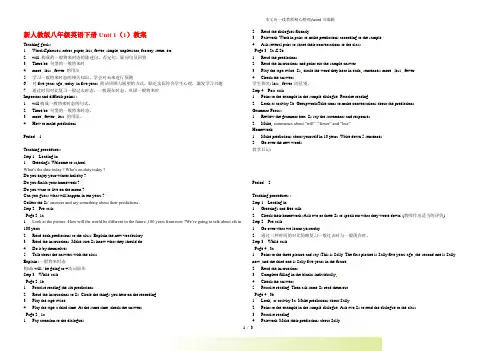
新人教版八年级英语下册Unit 1(1)教案Teaching goals:1. Words&phrases: robot, paper, less, fewer, simple, unpleasant, factory, seem, etc .2. will 构成的一般将来时态的陈述句、否定句、疑问句及回答.3. There be 句型的一般将来时.4. more , less , fewer 的用法.5. 学习一般将来时态的相关知识,学会对未来进行预测.6. 对five years ago ,today ,in five years 简洁回顾与展望的方式,贴近实际符合学生心理,激发学习兴趣.7. 通过时间对比复习一般过去时态、一般现在时态,巩固一般将来时.Important and difficult points :1. will构成一般将来时态的句式。
2. There be 句型的一般将来时态。
3. more , fewer , less 的用法。
4. How to make predictions .Period 1Teaching procedures:Step 1 Leading in1. Greetings: Welcome to sc hool .What’s the date today ? Who’s on duty today ?Do you enjoy your winter holiday ?Do you finish your homework ?Do you want to live on the moon ?Can you guess what will happen in ten years ?Collect the Ss’ answers and say something about their predictions .Step 2 Pre-taskPage 2 ,1a .1. Look at the picture :How will the world be different in the future ,100 years from now ?We’re going to talk about sth in 100 years .2. Read each predictions to the class .Explain the new vocabulary .3. Read the instructions .Make sure Ss know what they should do .4. Do it by themselves .5. Talk about the answers with the class .Explain :一般将来时态构成: will / be going to +动词原形Step 3 While-taskPage 2 ,1b .1. Practise reading the six predictions .2. Read the instructions to Ss .Circle the things you hear on the recording .3. Play the tape twice .4. Play the tape a third time .At the same time ,check the answers .Page 2 , 1c .1. Pay attention to the dialogues .2. Read the dialogues fluently .3. Pairwork .Work in pairs to make predictions according to the sample .4. Ask several pairs to share their conversations to the class .Page 3 , 2a & 2b .1. Read the predictions .2. Read the instructions and point out the sample answer .3. Play the tape twice .Ss circle the word they hear in each sentences: more , less , fewer .4. Check the answers .学生探究: less , fewer 的区别。
新人教版八年级英语下册Unit1(1)教案In this lesson。
we will be learning about health problems and how to give advice。
Our language goals are to learn vocabulary related to health problems and how to give advice based on someone's health issues。
Our skill goals are to be able to understand dialogues about health problems。
give advice based on someone's health issues。
and write key words and sentences related to health problems。
Our values goal is to cultivate students' empathy towards others' health and to promote a spirit of mutual help during emergencies.We will be focusing on phrases such as "have a stomachache," "have a cold," "lie down," "take one's temperature," "go to a doctor," "get off," "to one's surprise," "agree to do sth," "get into trouble," "fall down," "be used to," "run out (of)," "cut off," "get out of," "be in control of," "keep on (doing sth.)," and "give up." We will also be practicing sentences such as "What's the matter?" and "I have a stomachache。
Unit1What's the matter?第一课时Section A(1a2d)【教学目标】1.重点单词:matter,back,sore,throat,stomachache,foot,neck,stomach,fever,lie,rest,cough,X ray,toothache,headache 2重点短语:have a sore throat,have a stomachache,have a cold,lie down,take one's temperature,have a fever,go to a doctor 3重点句式:—What's the matter?—She talked too much yesterday and didn't drink enough water.She has a very sore throat now.You should drink some hot tea with honey.It doesn't sound like you have a fever.You need to take breaks away from the computer.I think I sat in the same way for too long without moving.If your head and neck still hurt tomorrow,then go to a doctor.【学习重点】1重点短语和句型2询问对方身体状况的句型及答语【学习难点】询问对方身体状况的句型及答语【自主学习】一、预习课本P12新单词并背诵,完成下面的汉译英。
1问题____________ 2.背部____________3疼痛的____________ 4.嗓子____________5胃痛____________ 6.脚____________7脖子____________8.胃____________9发烧____________10.平躺____________11休息____________12.咳嗽____________13X光____________14.牙疼____________15头疼____________二、认真预习1a2d找出下列短语和句型。
Unit 1 What's the matter?第一课时Section A (1a2d)【教学目标】1.重点单词:matter,back,sore,throat,stomachache,foot,neck,stomach,fever,lie,rest,cough,Xray,toothache,headache2 重点短语:have a sore throat,have a stomachache,have a cold,lie down,take one's temperature,have a fever,go to a doctor3 重点句式:—What's the matter?—She talked too much yesterday and didn't drink enough water.She has a very sore throat now.You should drink some hot tea with honey.It doesn't sound like you have a fever.You need to take breaks away from the computer.I think I sat in the same way for too long without moving.If your head and neck still hurt tomorrow,then go to a doctor.【学习重点】1 重点短语和句型2 询问对方身体状况的句型及答语【学习难点】询问对方身体状况的句型及答语【自主学习】一、预习课本P12新单词并背诵,完成下面的汉译英。
1 问题____________ 2.背部____________3 疼痛的____________ 4.嗓子____________5 胃痛____________ 6.脚____________7 脖子____________ 8.胃____________9 发烧____________ 10.平躺____________11 休息____________ 12.咳嗽____________13 X光____________ 14.牙疼____________15 头疼____________二、认真预习1a2d找出下列短语和句型。
Unit1 What's the matter?1. KnowledgeWords: have, cold, back, arm, ear, eye, foot, hand, head, leg, mouth, neck, nose, tooth, fever, rest, should, headache, ago, so, illness, thirsty, early, problem, way, traditional, believe, weak, angry, medicine, western, everybody, get, few, stay, important, moment, late, until, yesterday, hearPhrases: have a cold, be stressed out, a few, at the moment Structures: Have for talking about health problems.Modal: should / shouldn 't2. SkillsTalk about your health.Give advice.3. Learning Strategies Using what you know. Inferring content.II. BackgroundIII. Teaching Time: Six PeriodsPeriod OneTeaching Aims:1. Learn and master the following words and phrases: matter, have, cold, have a cold, stomachache, sore, back, arm, ear, foot, hand, head, leg, mouth, neck, nose, stomach, tooth, throat2. Develop the students'listening ability.3. Be able to talk about health.4. Sentence PatternsWhat 's the matter? I have a sore throat.Teaching Difficult Point The sentence patterns.Teaching Methods Listening practice to train the students 'listening ability.PairwrokTeaching AidsSome pictures.A tape recorder. Teaching ProceduresStep I Greetings.Step II. 1aTeach the students to study the new words by showing some pictures.eye, nose, mouth, ear, tooth, face, head, neck, back, stomach, arm, hand, leg, footAsk a student to read the list of thirteen names of body parts.Then let the students look at the picture and write the correct letter for each part of the body. Check the answers. Answers:k arm c back g ear i eye m foot a hand l head b leg f mouth e tooth d neck j nose h stomach Step III 1bShow some illnesses.e.g. I have a cold. I have a stomachache. Let several students say some illnesses.Ask a student to read the names. Nancy, Sarah, David, Ben, JudyThen play the recording the first time. Students only listen. Play the recording a second time. Students number the names. Cheek the answersAnswers:Nancy = 3 Sarah = 1 David = 2 Ben = 5 Judy = 4Step IV 1cAsk two students to read the conversation.A: What 's the matter?B: I have a sore throat.Then let the students make conversations in pairs.After some minutes, ask several pairs to say their conversations.Explain the language points.1. What 's the matter? 你怎么啦?这句话在口语中很常见,当别人遇到什么麻烦,或身体不舒服,你就可以问What ' the matter?意思是你怎么啦?/ 你遇到什么麻烦啦?/ 你哪儿不舒服?还可以在句末用介词with 表示对象。
启灵教育学员辅导资料课程名称八年级下英语上课时间2012 年02 月25 日课次第3 课次辅导老师朱老师辅导方式小班教学内容Unit1 Memory教学材料课本、教材完全解读、北大绿卡学生小班教学目标掌握if 条件状语从句,同时能够进行if \unless\or三种句型的互换。
掌握本单元必背的翻译句子。
教学重难点If 条件状语从句的主从时态。
翻译句子。
教学过程设计一.if 引导条件状语从句1.含义由if 引导的条件状语从句表示在某种条件下某事很可能发生或者必然发生。
2.用法与结构由if 引导的条件状语从句根据用法的不同可以分为两种结构:1)表示在某种条件下,某事很可能会发生:if + 从句(一般现在时),sb. will + 动词原形(即一般将来时)【主句】2)表示在某种条件下,某事必然会发生(常表示客观真理或普遍的现象)If + 从句(一般现在时),sb. be \ do (一般现在时) 【主句】二.unless 引导条件状语从句unless = if… not.. 表示“除非。
否则。
”if条件状语从句变unless 条件状语从句“三步走”:先将if 句改为if..not..句,再将if..not..句,去掉if..not, 加上unless后主句照抄,unless 放在前,从句尾巴加逗号,unless放在后,前面不要加逗号。
三.Or (否则)连词来做if和unless条件状语从句的同意句转换Sb. should do sth. , or sb. will \ won’t do sth.某人应该做某事,否则就会怎么样。
四.结合教案2的翻译句子进行解析五.课堂练习和作业Chapter 1 Memory启灵测试题姓名:_______________ 基础班_______培优班______(打钩即可)i. Multiple choice(共15小题,每小题1分,满分15分)( ) 1.You will be late for school ______ you leave now.A. ifB. unlessC. whenD. while( ) 2.Water turns into ice_____ you cool it.A. sinceB. unlessC. ifD. and( ) 3.A fish____ if you _____it out of water.A. dies,takeB. died ,tookC. dying, takingD. has died, has taken( ) 4.He is going to visit the Window of the world if it ____ tomorrow.A. don’t rainB.doesn’t rainC.didn’t rainD.won’t rain( ) 5.I ______ the CDs to you if I have time tomorrow.A. will giveB.gaveC.have givenD.give( )6. I won’t work out the problem_____________ the teacher helps me.A. ifB. becauseC. untilD. unless( ) 7. They didn’t start the work _____their teacher came back.A. untilB. unlessC. as soon asD. if( )8.. You will fall behind others _____ you work hard.A. unlessB. ifC. thoughD. because( )9. Tom had a headache, _____ he didn’t go to the party.A. becauseB. soC. butD. or( ) 10. None of us knew what had happened _____they told us about it.A. whenB. untilC. afterD. though( )11. I don’t know if it ________ tomorrow. If it__________ , I won’t go out.A. will rain, rainsB. will rain , will rainC. rains, rainsD. rains, will rain ( )12. You should not go out to play ______ you finish your lessonsA. unlessB. afterC. whenD. while( ) 13. I’ll go shopping with you if I ______free tomorrow.A. will beB. shall beC. amD. was( ) 14.You’ll do much better ___________ you’re more careful with your spelling.A. unlessB. beforeC. althoughD. if( ) 15.Nobody can learn English well _________ he works hard on it.A. ifB. whenC. unlessD. but( ) 16. I’ll go to the English corner next Sunday __________.A. if it will be sunnyB. if I am freeC. when I have no timeD. because I am free( )17. If there __________ happens, we usually remember it well.A.are something dramaticB. are dramatic somethingC. is something dramaticD. is dramatic something( )18. You’d better ___________ a rest ,__________ you ?A. had, hadB. have, haven’tC. to have, hadn’tD. have, hadn’t( )19. Oh, What ___________ you, Tom?A. happens toB. happen toC. happened toD. happened with( ) 20. What’s the di fference __________ this picture _________ that one?A. from… withB. between… andC. between… withD. from … and( ) 21. The teacher often helps me __________ English.A. inB. atC. toD. with( )22. If he _____ another 2 hours, he _____ everything ready.A. is given; will getB. has; getsC. will be given; will getD. will give; will getII. 用括号里的单词的适当形式填空。
1.When people get old, their memories become ____worse__________(bad)2.He borrowed several books from the library , __including____________(include)two novels.3.Memory is ____connected_________ with our feelings. (connect)4. He __lost__________ his memory after the accident. (lose)5. Thirty people were ___injured_________ (injure) in the big fire.6. We should respect the _old_________ (elder)people .7. Though the old man is 90 years old,he has a very good ____memory_____.(memorize)8. You can write well if you have good ___imagination (ima gine).9. Oh, no!The computer has __gone_________( go) wrong again.10. Mother told the kid never talk to other__strangers___________ (strange).11. If something dramatic happens, we usually remember it __well___________ (good)12. Did you hear about the ___death___________ (die) of the famous singer? She ____died_______ ( die) yesterday .13. You look pale. What __happened_______ to you ? ( happen)14. Gong Yanling from Harbin has an ___amazing_______ memory. ( amaze)15. Some old people cannot remember things happened for __longer_______ than a few minutes. ( long)17. Look at the poor cat . It has been ___dead________ for a few hours. (die)18. I’m sorry for ___being______ (be) late.19. It’s a ___funny________ sports game. (fun)20. The man can remember the correct order of 1,820 playing cards , after __seeing___________ ( see) them just once.III. 句型转换1.How much did you spend on the bike?How much __did__________ the bike ___cost_________?2.My computer didn’t work again.My computer ___broke________ ___down_______ again.3. If you don’t study hard , you will fail the exam.__Unless_________ you study hard, you __will____ __fail_____ the exam4.The fireman was hurt in the big fire..The fireman ____was_______ ___injured_________ in the big fire..5. A man who lost his memory couldn’t remember anything in his life.A man who lost his memory couldn’t _memorize____ anything in his life.A man who lost his memory __forgot________ everything in his life.6. Your mother will be angry unless you do your homework,Your mother will be angry ___if ________you __don’t_____ __do_______your homework.7. Remember to turn off the lights when you leave.___Don’t _____ __forget______ to turn off the lights when you leave.8.His father left two days ago.His father has __been ______ ___gone________ for two days.9. A woman from Harbin has memorized 15,000 telephone numbers. (就划线部分提问)__Which_____ woman ___has__________ memorized 15,000 telephone numbers?10.His wife visited him in hospital every day. (就划线部分提问)___How_________ __often_______ ___did_______ his wife visit him in hospital? VI. 解释句子1. The radio went wrong yesterday.The radio stopped working correctly.2. They were injured in the accident .They were hurt in the accident.3. He can’t memorize all the words in 20 minutes.He can’t remember all the words in 20 minutes.4. You can watch TV after finishing your homework.You can not watch TV until you finish your homework.If you finish your homework, you can watch TV.Unless you finish your homework, you can not watch TV.4.Unless you keep ice cream in a fridge, it melts.If you don’t keep ice-cream in a fridge, it melts.教学处审核部门主管审核。